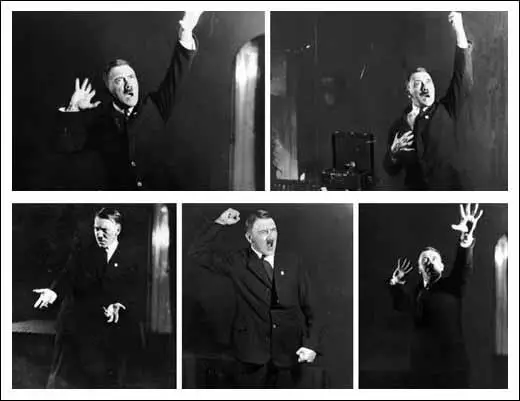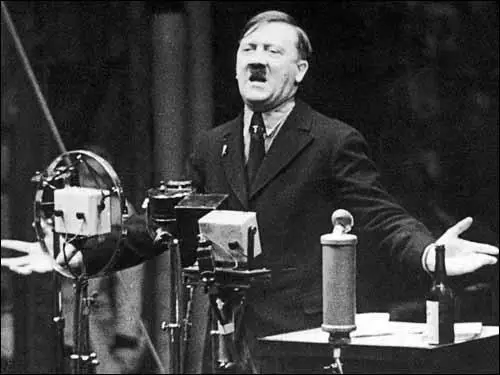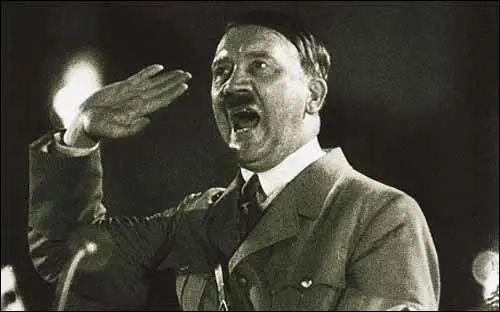Adolf Hitler the Orator (Classroom Activity) (original) (raw)
In September 1919, Adolf Hitler was sent by Captain Karl Mayr to spy on the German Workers' Party. Hitler was just about to leave when a man in the audience made a point that he disagreed with and joined in the discussion. Hitler made a speech that impressed, Anton Drexler, the leader of the GWP, and he was invited to join the party. After pressure from Mayr he became a member of the party.
Hitler became the main speaker at GWP public meetings. It was during this period that he developed the techniques that made him into such a persuasive orator. Hitler always arrived late which helped to develop tension and a sense of expectation. He took the stage, stood to attention and waited until there was complete silence before he started his speech. For the first few months Hitler appeared nervous and spoke haltingly. Slowly he would begin to relax and his style of delivery would change. He would start to rock from side to side and begin to gesticulate with his hands. His voice would get louder and become more passionate. Sweat poured of him, his face turned white, his eyes bulged and his voice cracked with emotion. He ranted and raved about the injustices done to Germany and played on his audience's emotions of hatred and envy. By the end of the speech the audience would be in a state of near hysteria.
As soon as his speech finished Hitler would quickly leave the stage and disappear from view. Refusing to be photographed, Hitler's aim was to create an air of mystery about himself, hoping that it would encourage others to come and hear the man who was now being described as "the new Messiah".
Primary Sources

(Source 1) Photographs taken by Heinrich Hoffmann to help Hitler select the
right gestures when speaking (August, 1927)
(Source 2) Alexander von Muller, a Munich teacher, described a NSDAP meeting addressed by Hitler in 1923.
For hours, endless booming military music; for hours, short speeches by subordinate leaders. When was he coming? Had something unexpected happened? Nobody can describe the fever that spread in this atmosphere. Suddenly there was a movement at the back entrance. Words of command. The speaker on the platform stopped in mid-sentence. Everybody jumped up, saluting. And right through the shouting crowds and the streaming flags the one they were waiting for came with his followers, walking quickly to the platform, his right arm raised stiffly. He passed me quite close and I saw. This was a different person from the one I had met now and then in private houses; his gaunt, pale features contorted as if by inward rage, cold flames darting from his protruding eyes, which seemed to be searching out foes to be conquered.
(Source 3) Ernst Hanfstaengel attended one of Hitler's meetings in 1923.
What was suddenly holding these people who, on the hopeless incline of the falling mark, were engaged in a daily struggle to keep themselves within the line of decency? The talking had stopped, and they were drinking in every word. Only a few yards away was a young woman, her eyes fastened on the speaker. Transfixed as though in some devotional ecstasy, she had ceased to be herself, and was completely under the spell of Hitler's faith in Germany's future greatness.
(Source 4) Hitler making a speech (c. 1930)
(Source 5) Kurt Ludecke first heard Hitler speak in 1922.
I studied this slight, pale man, his brown hair parted on one side and falling again and again over his sweating brow. Threatening and beseeching, with small pleading hands and flaming steel-blue eyes, he had the look of a fanatic. Presently my critical faculty was swept away... he was holding the masses, and me with them, under a hypnotic spell by the sheer force of his conviction.
(Source 6) Adolf Hitler, Mein Kampf (1925)
I know that men are won over less by the written than by the spoken word, that every great movement on this earth owes its growth to orators and not to great writers.
(Source 7) Alan Bullock, Hitler: A Study in Tyranny (1962)
As an orator Hitler had obvious faults. The timbre of his voice was harsh, very different from the beautiful quality of Goebbels's. He spoke at too great length; was often repetitive and verbose; lacked lucidity and frequently lost himself in cloudy phrases. These shortcomings, however, mattered little beside the extraordinary impression of force, the immediacy of passion, the intensity of hatred, fury, and menace conveyed by the sound of the voice alone without regard to what he said. One of the secrets of his mastery over a great audience was his instinctive sensitivity to the mood of a crowd, a flair for divining the hidden passions, resentments and longings in their minds.
(Source 8) Otto Strasser, Hitler and I (1940)
Adolf Hitler enters a hall. He sniffs the air. For a minute he gropes, feels his way, senses the atmosphere. Suddenly he bursts forth. His words go like an arrow to their target, he touches each private wound on the raw, liberating the mass unconscious, expressing its innermost aspirations, telling it what it most wants to hear....
Hitler responds to the vibrations of the human heart with the delicacy of a seismograph, or perhaps of a wireless receiving set, enabling him, with a certainty with which no conscious gift could endow him, to act as a loud-speaker proclaiming the most secret desires, the least admissible instincts, the sufferings and personal revolts of a whole nation...
I have been asked many times what is the secret of Hitler's extraordinary power as a speaker. I can only attribute it to his uncanny intuition, which infallibly diagnoses the ills from which his audience is suffering.... But his very principle is negative. He only knows what he wants to destroy. He pulls down the walls without any idea of what he will build in their place.
(Source 9) Ron Rosenbaum, interview with George Steiner (1998)
I was born in 1929, so from 1933 on my earliest memories are sitting in the kitchen hearing the voice of Hitler on the radio.
It's a hard thing to describe, but the voice itself was mesmeric... The amazing thing is that the body comes through on the radio. I can't put it any other way. You feel you're following the gestures.
In the German language, Hitler drew on a kind of rhetorical power which - in a way is perhaps a little bit peculiar to German - allies highly abstract concepts with political, physical violence in a most unusual way. And Hitler was easily a genius at that, absolutely no doubt about it.
(Source 10) Adolf Hitler (1934)
(Source 11) During his career Hitler made several comments on the techniques he used as an orator.
(1) The receptivity of the great masses is extremely limited, their intelligence is small, their forgetfulness - enormous. Therefore all effective propaganda must be limited to a very few points and they should be used like slogans until the very last man in the audience is capable of understanding what is meant by this slogan... the masses... will only ultimately remember only the simplest ideas repeated a thousand times over.
(2) If I approach the masses with reasoned arguments, they will not understand me. But if I awaken in them the appropriate emotions, then they will follow the simple slogans I give them. In the mass meeting, the reasoning power is paralysed... (what I say) will be like an order given under hypnosis.
(3) The masses do not understand unless they are made aware of their master. The cruder and more brutal your language, the larger the crowd who will be ready to listen to you... Haven't you ever seen a crowd collecting to watch a street brawl? Brutality and physical strength is what they respect. The man in the street respects nothing more than strength and ruthlessness - women too for that matter. The masses need something that will give them a thrill of horror.
(Source 12) Boris Johnson, The Churchill Factor: How One Man Made History (2015)
Look at Hitler, if you can bear it, and see his hypnotic quality. First the long, excruciating pause before he speaks; and then see how he begins so softly - with his arms folded - and how he uncoils them as his voice starts to rise, and then the awful jabbing fluidity of his gestures, perfectly timed to intensify the crescendos of his speech.
Yes, he has some paper on the table in front: but he hardly refers to it. He seems to be speaking entirely without notes. See the effect on his audience: the happy beams on the faces of the young women, the shouts from the men, and the way their arms rise as one to salute him like the fronds of some huge undersea creature.
Listen to the way he brings them all to their collective climax: with short verb less phrases – grammatically meaningless, but full of suggestive power. It was to become a highly influential technique, copied, among others, by Tony Blair.
Questions for Students
Question 1: Study source 1. Hitler used to try out his speeches in front of the mirror. He also got his friend, Heinrich Hoffmann, to take photographs of him speaking without an audience. Why did he do this?
Question 2: Use quotations from the sources to show what affect Hitler's speeches had on his audience.
Question 3: What strategies did Hitler use to achieve the effects that you have described in your previous answer?
Answer Commentary
A commentary on these questions can be found here.

